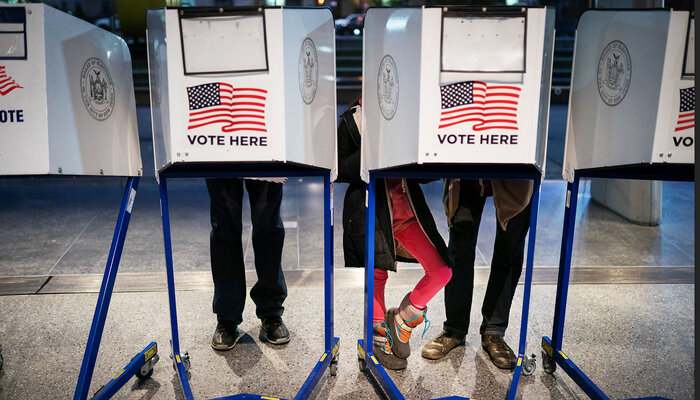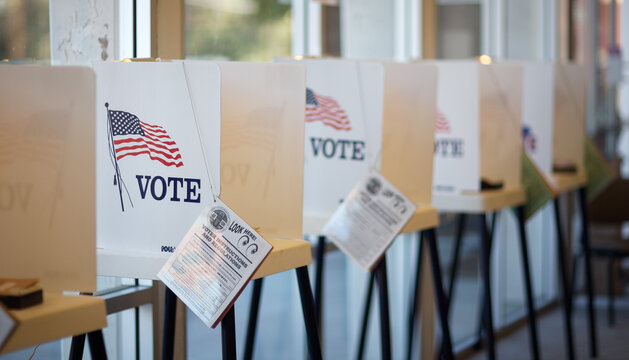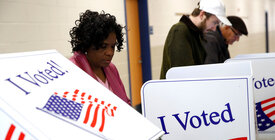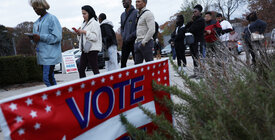Click here for the most recent Voting Laws Roundup.
Over the past three years, states have enacted restrictive voting laws at breakneck speeds, and that trend continues in 2023. At the same time, even more states have taken a different path, enacting new laws to make voting easier. Indeed, this year, there have been nearly three new expansive laws enacted for every restrictive law, the biggest ratio since 2020.
The wave of pro-voter legislation follows the 2022 midterms, when voters largely rejected election-denying candidates in swing states. At least four of those states — Michigan, Minnesota, Nevada, and New Mexico — enacted multiple expansive voting laws or an omnibus pro-voter law in 2023. Nearly half of all states enacted at least one expansive voting law this year. And most of this year’s expansive voting laws have been passed since our last roundup in June.
There remains a stark divide between states. On one side are those that are broadening democratic participation. On the other are those making it harder to vote and easier for partisan officials to interfere in democratic processes. Many states passing new restrictive laws are the places where it is already hard to vote.
More restrictive laws have been enacted this year than in any year of the last decade except 2021. Some of these laws may have drastic consequences for voters who wish to participate in the 2024 elections. And several states have set the stage for election interference schemes next year.
In all but seven states, regular legislative sessions have ended.1 Between January 1 and October 10, 2023:
- At least 14 states enacted 17 restrictive laws, all of which will be in place for the 2024 general elections.2 Many of these new laws target voting by mail.
- At least 6 states enacted 7 election interference laws, with all 7 taking effect before the November 2024 elections.3
- At least 23 states enacted 47 expansive laws, highlighted by comprehensive pro-voter legislation in Colorado, Michigan, and New York. All but 1 will be in full effect for the 2024 general elections.4
Of particular note, Republicans in the North Carolina legislature have used their veto-proof majority to push through two sweeping laws, one of which restricts voting access and the other of which undermines election administration. Also notable is a new Texas law that allows for extreme state oversight of Harris County’s day-to-day election administration.
More than a dozen pieces of restrictive legislation passed since 2021 are facing legal challenges, including provisions of restrictive voting laws passed this year in Mississippi and Florida that have been temporarily blocked by federal courts.
Endnotes
-
1
Massachusetts, Michigan, New Jersey, North Carolina, Ohio, Pennsylvania, and Wisconsin are still in regular session. -
2
AR H.B. 1411, FL S.B. 7050, ID H.B. 124, ID H.B. 340, IN H.B. 1334, KS S.B. 106, MS H.B. 1310, MS S.B. 2358, NE L.B. 514, NM S.B. 180, NC S.B. 747, ND H.B. 1431, SD H.B. 1165, TX S.B. 924, UT S.B. 17, WY H.B. 279, WY S.F. 153. Legislation is categorized as restrictive if it contains one or more provisions that would make it harder for eligible Americans to register, stay on the voter rolls, or vote as compared to existing state law. -
3
AR H.B. 1411, AR S.B. 272, FL S.B. 4-B, GA S.B. 222, NC S.B. 749, SD H.B. 1165, TX S.B. 1933. Legislation is categorized as election interference if it either threatens the people and processes that make elections work or increases opportunities for partisan interference in election results or administration. -
4
AR H.B. 1512, AR S.B. 247, CA A.B. 545, CA A.B. 626, CO S.B. 276, CT H.B. 5004, CT H.B. 6941, GA S.B. 129, IL S.B. 2123, KS S.B. 221, LA H.B. 449, ME L.D. 886, ME L.D. 1653, MD H.B. 410, MI H.B. 4697, MI H.B. 4699, MI S.B. 259, MI S.B. 367, MI S.B. 370, MI S.B. 373, MN H.F. 3, MN H.F. 28, NV A.B. 286, NV S.B. 216, NV S.B. 327, NJ A.B. 5175, NM H.B. 4, NM S.B. 180, NY A.B. 4009, NY A.B. 7690, NY S.B. 1733, NY S.B. 1327, NY S.B. 5984, NY S.B. 7394, OR H.B. 2107, OR S.B. 166, TX H.B. 1217, TX S.B. 477, TX S.B. 1599, UT H.B. 37, UT S.B. 17, VA H.B. 1948, WA H.B. 1048, WA S.B. 5112, WA S.B. 5208, WV S.B. 631, WY H.B. 79. Legislation is categorized as expansive if it contains one or more provisions that would make it easier for eligible Americans to register.




